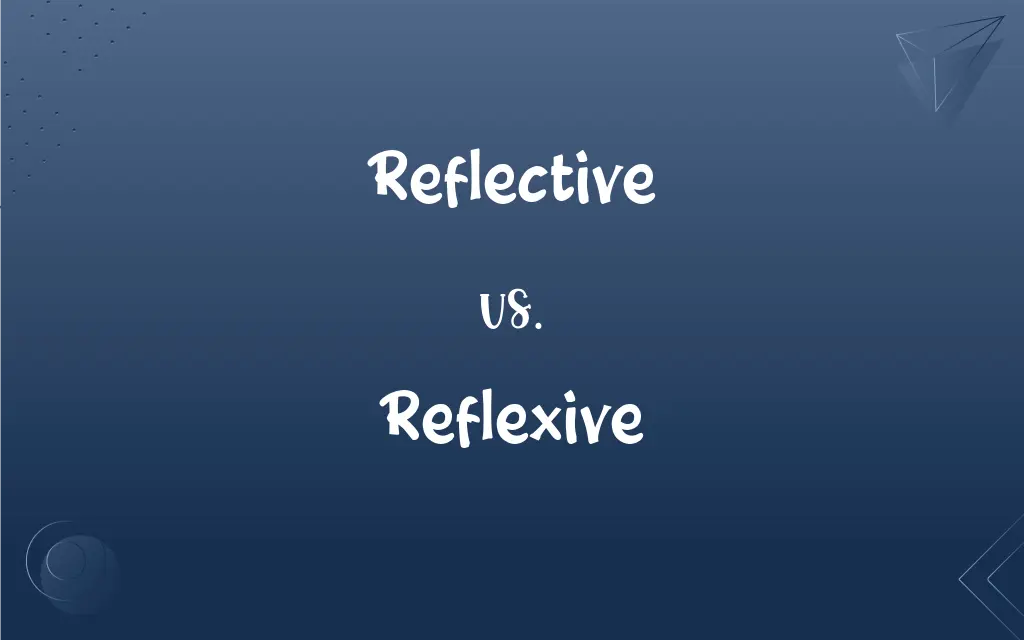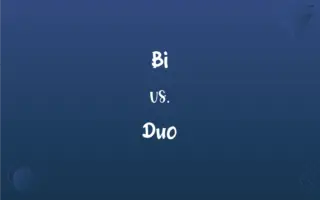Reflective vs. Reflexive: What's the Difference?
By Aimie Carlson & Janet White || Updated on March 4, 2024
Reflective involves deep thinking or the capability to reflect light, focusing on thoughtful consideration or physical reflection. Reflexive relates to automatic responses or self-referential actions in grammar, emphasizing instinctive reactions.

Key Differences
Reflective thinking entails a deliberate, thoughtful process where individuals consider their actions, experiences, or information deeply to gain insights or understanding. This type of contemplation is fundamental in learning and personal growth, encouraging a critical examination of one's beliefs and actions. In physics, reflective refers to the ability of a surface to throw back light or heat, not absorbing it, which is a property exploited in various technologies and safety equipment to increase visibility. On the other hand, reflexive actions are involuntary, occurring without conscious thought, as seen in physiological reactions like the knee-jerk response. In grammar, reflexive pronouns (myself, yourself, themselves, etc.) are used to indicate that the subject of the sentence is also the object of the action, reflecting the action back onto the subject.
The reflective process is characterized by introspection and analysis, often leading to profound personal or professional development. Educators and psychologists stress the importance of reflective practices for enhancing critical thinking skills and emotional intelligence. In contrast, reflexive responses are immediate and automatic, serving as a mechanism for protection or quick reactions in humans and animals alike. Reflexive grammar constructs help to enrich language, allowing for nuanced self-reference and clarity in communication.
Reflective materials, such as mirrors or high-visibility clothing, are designed to return light to its source, thereby increasing visibility and safety. This physical property of reflection is essential in various applications, from safety gear to solar power technologies. Reflexive, in its grammatical sense, adds depth to language by enabling speakers to construct sentences where subjects perform actions on themselves, thereby expanding the expressiveness and precision of language use.
In educational contexts, reflective practices may involve journaling, discussions, or self-assessment exercises aimed at fostering a deeper understanding of content or experiences. These practices are key to developing a reflective mindset, crucial for lifelong learning and adaptability. Reflexive actions, while not typically under conscious control, can be conditioned or influenced over time through training or therapy, highlighting the interplay between innate responses and learned behavior.
Despite their differences, both reflective and reflexive processes are integral to human experience, encompassing the breadth of our cognitive, linguistic, and physiological capabilities. Reflective practices enrich our mental and emotional lives, fostering growth and learning, while reflexive mechanisms and language structures enable us to navigate the world and communicate more effectively and efficiently.
ADVERTISEMENT
Comparison Chart
Definition
Involving deep thought or the ability to reflect light.
Pertaining to automatic responses or self-referential actions in grammar.
Contexts
Learning, personal development, physics.
Physiology, grammar.
Key Qualities
Introspective, analytical, capable of reflecting light.
Automatic, instinctive, self-referential.
Examples
Reflective journaling, reflective surfaces.
Reflex actions, reflexive pronouns.
Purpose
To foster understanding and growth, to increase visibility and safety.
To protect, react quickly, and clarify sentence subjects and objects.
ADVERTISEMENT
Reflective and Reflexive Definitions
Reflective
Able to send back light or heat from a surface.
Reflective vests are crucial for night-time safety.
Reflexive
Involving actions performed as immediate reactions.
His reflexive response saved the child from falling.
Reflective
Related to the reflective practice in education.
Reflective discussions enhance students' critical thinking.
Reflexive
Used to describe self-referential processes or properties.
Reflexive thinking can lead to self-awareness.
Reflective
Capable of serious thought or contemplation.
Reflective journaling helps him understand his learning process.
Reflexive
Referring back to the subject in grammar.
She prides herself on her independence uses a reflexive pronoun.
Reflective
Of, relating to, produced by, or resulting from reflection.
Reflexive
Directed back on itself.
Reflective
Capable of or producing reflection
A reflective surface.
Reflexive
Of, relating to, or being a verb having an identical subject and direct object, as dressed in the sentence She dressed herself.
Reflective
Characterized by or given to serious thinking or contemplation; thoughtful.
Reflexive
Of, relating to, or being the pronoun used as the direct object of a reflexive verb, as herself in She dressed herself.
Reflective
That reflects, or redirects back to the source.
Mirrors are reflective.
Reflexive
Of or relating to a reflex.
Reflective
Pondering, especially thinking back on the past.
He always becomes reflective in preparation for the new year.
Reflexive
Elicited automatically; spontaneous
"a bid for ... reflexive left-wing approval" (Marshall Delaney).
Reflective
That reveals or shows; revealing; indicative of.
Reflexive
A reflexive verb or pronoun. See Usage Note at myself.
Reflective
Involving reflection.
Reflexive
(grammar) Referring back to the subject, or having an object equal to the subject.
Reflective
(grammar) Reciprocal.
Reflexive
(mathematics) Of a relation R on a set S, such that xRx for all members x of S (that is, the relation holds between any element of the set and itself).
"Equals" is a reflexive relation.
Reflective
Throwing back images; as, a reflective mirror.
In the reflective stream the sighing bride, viewing her charms.
Reflexive
Of or resulting from a reflex.
The electric shock elicited an automatic and reflexive response from him.
Reflective
Capable of exercising thought or judgment; as, reflective reason.
His perceptive and reflective faculties . . . thus acquired a precocious and extraordinary development.
Reflexive
(figurative) Producing immediate response, spontaneous.
A reflexive dislike
Reflective
Addicted to introspective or meditative habits; as, a reflective person.
Reflexive
Synonym of reflective
Reflective
Reflexive; reciprocal.
Reflexive
(grammar) A reflexive pronoun.
Reflective
Persistently or morbidly thoughtful
Reflexive
(grammar) A reflexive verb.
Reflective
Capable of physically reflecting light or sound;
A reflective surface
Reflexive
Bending or turned backward; reflective; having respect to something past.
Assurance reflexive can not be a divine faith.
Reflective
Devoted to matters of the mind;
The reflective type
Reflexive
Implying censure.
Reflective
Involving careful consideration of one's actions.
The teacher's reflective feedback improved her teaching methods.
Reflexive
Having for its direct object a pronoun which refers to the agent or subject as its antecedent; - said of certain verbs; as, the witness perjured himself; I bethought myself. Applied also to pronouns of this class; reciprocal; reflective.
Reflective
Concerned with mirroring or reflection.
The reflective surface of the lake captured the sunset beautifully.
Reflexive
A personal pronoun compounded with -self to show the agent's action affects the agent
Reflexive
Without volition or conscious control;
The automatic shrinking of the pupils of the eye in strong light
A reflex knee jerk
Sneezing is reflexive
Reflexive
Referring back to itself
Reflexive
Happening automatically without conscious thought.
Blinking is a reflexive action to protect the eyes.
Reflexive
Pertaining to reflexive verbs in languages.
In Spanish, se lavan means they wash themselves, showcasing a reflexive verb.
FAQs
How is reflective used in education?
In education, reflective practices involve analyzing experiences or knowledge to deepen understanding and foster personal growth.
Can reflective thinking be developed?
Yes, reflective thinking can be developed through practices like journaling, meditation, and engaging in dialogues that encourage introspection.
What does reflective mean?
Reflective can refer to deep thought and consideration or the physical property of a surface to reflect light or heat.
What role do reflexive pronouns play in grammar?
Reflexive pronouns clarify that the subject of the sentence is performing an action on itself, adding clarity and nuance to language.
How do reflective materials work?
Reflective materials work by bouncing back light or heat to its source, rather than absorbing it, which is why they are used in safety equipment.
What's the difference between reflective and reflexive learning?
Reflective learning involves deliberate thought to understand and improve, while reflexive learning might refer to instinctual adjustments based on immediate feedback.
Can a person be both reflective and reflexive in their actions?
Yes, a person can exhibit both reflective and reflexive behaviors, engaging in deep thought in some situations while reacting automatically in others.
How do reflective surfaces contribute to safety?
Reflective surfaces, like those on safety vests or road signs, increase visibility by reflecting light directly back to its source, making them more noticeable in low-light conditions.
What are reflexive actions?
Reflexive actions are automatic, involuntary responses to stimuli, occurring without conscious thought.
What is the importance of reflective practice in professional development?
Reflective practice is crucial in professional development as it encourages individuals to continually evaluate and improve their skills and approaches based on past experiences.
What is a reflexive pronoun?
A reflexive pronoun is a pronoun used when the subject of a sentence is also the object of the action, referring back to the subject.
How does reflective writing benefit students?
Reflective writing benefits students by allowing them to articulate and analyze their learning experiences, fostering a deeper understanding of the subject matter and their own thought processes.
How do educators incorporate reflexive actions into learning?
Educators can incorporate reflexive actions into learning by using immediate feedback mechanisms, such as interactive quizzes or activities that prompt an instinctive response, to reinforce learning.
Why are reflexive actions important?
Reflexive actions are important for protecting the body from harm and allowing quick responses to immediate threats or needs.
Are reflexive verbs common in all languages?
Reflexive verbs are present in many languages, each with its own rules for use. They are particularly common in Romance languages like Spanish, French, and Italian.
Can reflexive actions be controlled or suppressed?
While reflexive actions are automatic, some, like the gag reflex, can be controlled or suppressed with practice and conditioning.
What's the relationship between reflective learning and critical thinking?
Reflective learning fosters critical thinking by encouraging individuals to question their assumptions, understand different perspectives, and make informed decisions based on thoughtful analysis.
Is there a psychological basis for reflexive actions?
Yes, reflexive actions are based on the nervous system's automatic response to certain stimuli, designed to protect the body and maintain homeostasis without the need for conscious thought.
What is the role of reflexivity in social research?
In social research, reflexivity involves researchers critically examining their own biases, assumptions, and influence on the research process, aiming to increase the credibility and objectivity of their findings.
Can reflective practices reduce stress?
Yes, engaging in reflective practices like meditation or mindful reflection can help individuals understand and manage their stressors more effectively, leading to reduced stress levels.
About Author
Written by
Aimie CarlsonAimie Carlson, holding a master's degree in English literature, is a fervent English language enthusiast. She lends her writing talents to Difference Wiki, a prominent website that specializes in comparisons, offering readers insightful analyses that both captivate and inform.
Co-written by
Janet WhiteJanet White has been an esteemed writer and blogger for Difference Wiki. Holding a Master's degree in Science and Medical Journalism from the prestigious Boston University, she has consistently demonstrated her expertise and passion for her field. When she's not immersed in her work, Janet relishes her time exercising, delving into a good book, and cherishing moments with friends and family.































































